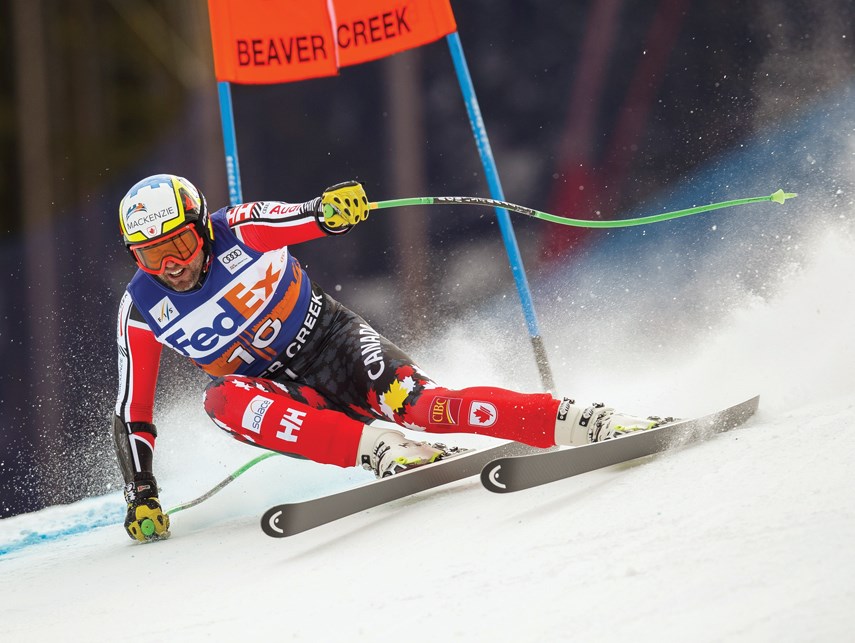North Vancouver’s Manuel Osborne-Paradis, for many years known as the wildest buckaroo of the Canadian Cowboys of alpine skiing fame, now has a different role on the national team: Dad.
For starters, the man known as Manny is now literally a father, with daughter Sloane celebrating her first birthday last November. On top of that, however, he is also, at age 33, one of the elder statesmen on the national ski team as they gear up for the 2018 Winter Olympics which begin in a little more than two weeks from now in Pyeongchang, South Korea. Many of his fellow Cowboys have retired, leaving Osborne-Paradis to lead a team of youngsters fighting for respect in the fast-paced world of alpine racing.
During a conference call with reporters last week, Osborne-Paradis joked that his fatherly role applies not just to the baby at home in Canada but to the youngsters on the road with him on the World Cup circuit.
“I have a bunch of other kids on the road – they’re 20,” he said with a laugh. “I still treat them like my kids sometimes.”
When it comes to racing in bigtime events, however, father does know best. Osborne-Paradis is the top-ranked Canadian in the downhill World Cup standings for the season, sitting in 17th place. He’s also the top Canadian in the overall standings in 54th place. He won bronze in Super G at the World Ski Championships last February and has 11 World Cup medals, including three golds, on his resume. Manny also knows his way around an Olympic Village, as South Korea will be his fourth Olympic Games.
He may not be posting the best results of his career so far this season – his best finish was a 10th-place showing in downhill in Bormio, Italy – but Osborne-Paradis said his experiences away from the slopes have given him a much more stable base than he’s had throughout his career.
“Every Olympics I’ve gone to I’ve been at a different place in my life. Now I’m very confident with how I’m doing as a person,” he said. “I’m a dad, I’ve got a house and life just keeps rolling through. It’s not as complicated as when you’re in Europe and you might not fly home because there’s nothing to go home to.”
Manny definitely has something to fly home to these days. He praised Alpine Canada for allowing him to spend more time with his wife Lana and their daughter at their home in Invermere, B.C. Speaking on a video call from Austria where he was prepping for the all-important Kitzbuehel races, a bit of a wistful look crossed his face when asked what it’s been like balancing life as a skier and a father.
“I go on the road and I have to be a ski racer. It’s pretty hard to be a father from 7,000 kilometres away,” he said, adding that he guesses it’s not his daughter who is most affected by his absences. “I think it’s more my wife that notices.”
Aside from daily Skype calls, daddy duty is mostly on hold these days as Manny and the rest of the team are at the most critical part of their season, having just competed in Kitzbuehel on Saturday with Germany’s Garmisch-Partenkirchen on the schedule this weekend. And just beyond that is the Olympic downhill race, scheduled for Feb. 10 in South Korea.
Osborne-Paradis finished 25th in Super G and 23rd in downhill in Kitzbuehel, regarded by many racers as the premier event of each ski season. That the schedule has the racers competing on Europe’s toughest courses so soon before the Olympics has actually reduced the usual pressure that skiers often feel every four years when the Games roll around.
“These are the most important races of our season,” Osborne-Paradis said. “It’s the core part of the year and that takes away from any Olympic thoughts right now.”
The five-ring circus, however, was still a big topic of discussion during Manny’s chat with reporters. His career best Olympic finish was a 13th-place showing on the Sestriere downhill course at the 2006 Games in Italy. Osborne-Paradis called the Olympic downhill course at Jeongseon Alpine Centre an “intermediate” run compared to the slopes the skiers typically see on the World Cup circuit, adding that it should set up well for his style of skiing.
“It doesn’t have a gliding section but it’s not very steep so I think it suits me better than guys who are really good at charging down steep hills,” he said. “There is nothing too worrisome about the race course. It is a very intermediate course where we still have to race against the best guys in the world.”
In South Korea Manny will be fighting for a spot near the top of the leaderboard just as he does every other week on the World Cup circuit.
“Top-10s are the goal, that’s my minimum at each race,” he said. “If I’m not top-10, I’m not happy about it.”



